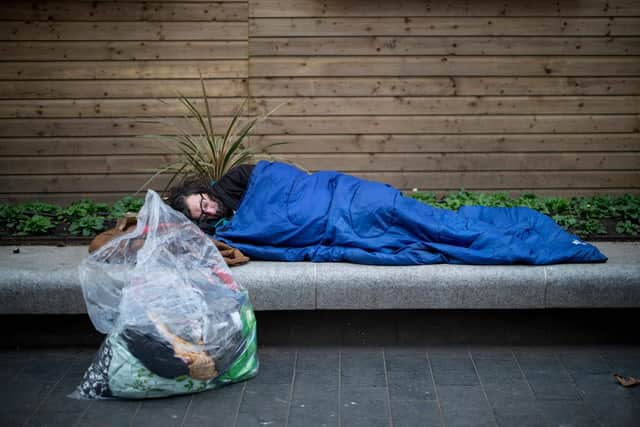Cost of living crisis has seen rough sleeping surge in Edinburgh. We need more affordable homes – Ewan Aitken
and live on Freeview channel 276
Please be clear, I’m not talking about begging, which is sometimes but not always synonymous with rough sleeping. The number of people rough sleeping in the city during and just after lockdown dropped to less than ten from being regularly over 100 prior to the pandemic.
Concerted efforts by several charities, including Cyrenians, in partnership with the city council and the Scottish Government, turned the challenge of lockdown into an opportunity for collaboration which saw literally hundreds of people, not just those rough sleeping but others who had been homeless or on the edge of homeless for many years, into much better accommodation. There are many unsung heroes who get enormous credit for making the opportunity created by that challenge a reality.
Advertisement
Hide AdAdvertisement
Hide AdIt changes systems too. We no longer have a night shelter in Edinburgh; instead, there are hotel rooms block-booked by the council and run by our colleagues at Bethany, with several other charities in support.
The problem is, despite being a very good thing, it’s not enough. Already, those rooms are often full. The numbers tipping into homelessness are increasing because of the cost-of-living crisis, the economic challenges following the pandemic, the removal of accommodation for people with no recourse to public funds (a rule suspended during lockdown), and a whole range of pressures. It’s not one thing but many, which is why, despite huge efforts by many, those rough sleeping numbers are creeping back up to 30 or 40-plus a night.
Another big factor is there's so little affordable accommodation to move into. Over 4,500 people are in temporary accommodation in Edinburgh (around 32 per cent of the Scotland-wide total). The average length of time in temporary accommodation in Edinburgh is over 345 days. That’s just the average time; for some people, it’s more than two years. We have an extreme housing crisis in Edinburgh, and it needs some extreme solutions, both in the immediate term and in the form of significant new affordable housing. We need to act quickly.
The council has identified enough brownfield sites (land which has already been used for something other than green space) to build the number of houses we need, a lot of which it already owns. But it needs the money to build the houses. At present, Edinburgh has 60 per cent of the demand for social housing in Scotland, but only ten per cent of the money allocated for it by the Scottish Government.
Advertisement
Hide AdAdvertisement
Hide AdThe irony is, if that extra money was given by the Scottish Government, it would put Edinburgh in a better financial position. People would be paying rent to the council instead of private landlords, and be in a better position to access work and other activities which they are less able to do when they’re homeless, even in temporary accommodation.


Ending homelessness is not just about keys to a home. It's about the time and support to build new relationships and rebuild broken ones. It’s about having the chance to work or volunteer. It’s about being part of a community again. But without a home, these things are very hard to achieve.
Ewan Aitken is CEO of Cyrenians
Comment Guidelines
National World encourages reader discussion on our stories. User feedback, insights and back-and-forth exchanges add a rich layer of context to reporting. Please review our Community Guidelines before commenting.